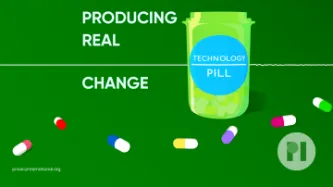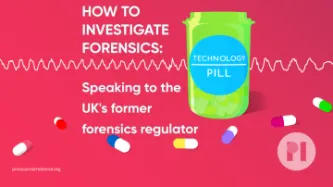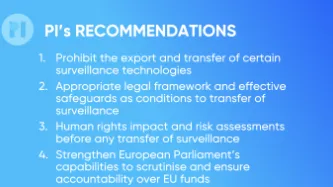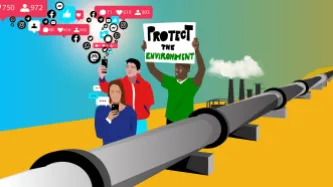Advanced Search
Content Type: News & Analysis
Our mobile phones contain all kinds of data that ranges from photos, videos and emails to information about our health, the places we visit and our leisure time. This data is often relied upon by law enforcement authorities in criminal investigations.
Mobile phone extraction (MPE) tools are used for this purpose as they enable police and other authorities to download content and associated data from people’s phones. These tools are supplied by private companies to security forces and…
Content Type: Long Read
In August 2021, PI published the report An unhealthy diet of targeted ads where we uncovered how personal data was shared by diet companies through their online ads and online testing. Our findings were quite grim, with highly sensitive personal data shared with third parties without consent.
Following this initial report, we performed follow-up research with the same methodology and by September 2021 we reported a number of positive changes from two of these websites: BetterMe and VShred.…
Content Type: Report
PI has been fighting against police using intrusive & disproportionate surveillance technologies at protests around the world for years. Unregulated surveillance and indiscriminate intrusions on our privacy have a chilling effect on the right to freedom of assembly.
We've fought to uncover the types of technologies that police secretly deploy at protests, and we have detailed how protesters around the world can try to protect their intimate and sensitive data from being captured by the…
Content Type: Long Read
We won our case against the UK’s Security Service (MI5) and the Secretary of State for the Home Department (SSHD). The Investigatory Powers Tribunal (IPT) – the judicial body responsible for monitoring UK’s intelligence and security agencies – held that MI5 acted unlawfully by knowingly holding people’s personal data in systems that were in breach of core legal requirements. MI5 unlawfully retained huge amounts of personal data between 2014 and 2019. During that period, and as a result of these…
Content Type: Press release
In a landmark judgment, handed down today (Monday 30 January 2023), the Investigatory Powers Tribunal have found that there were “very serious failings” at the highest levels of MI5 to comply with privacy safeguards from as early as 2014, and that successive Home Secretaries did not to enquire into or resolve these long-standing rule-breaking despite obvious red flags.Human rights organisations Liberty and Privacy International, who brought this significant legal case in January 2020, have…
Content Type: Long Read
The rise of the gig-economy, a way of working relying on short term contracts and temporary jobs rather than on an employed workforce, has enabled the growth of a number of companies over the last few years. But without the rights that comes with full employment, gig economy workers today don't have access to essential protections.
In 2021, PI worked with ACDU and Worker Info Exchange to shed a light on the power imbalance between workers and gig economy platforms, exposing how workers find…
Content Type: Advocacy
Following our comments on the draft Treaty text, PI's intervention, during the fourth session, focused on the provisions of the draft Treaty that deal with procedural measures and law enforcement. Specifically, we emphasised that the investigative measures contained in the draft Treaty should only be limited to serious offences only that are established by the Treaty. In addition, we urged delegates to remove a provision contained in the draft Treaty text that would allow authorities to exploit…
Content Type: Long Read
On 18th January, it was announced that end-to-end encrypted iCloud services, Advanced Data Protection, would be offered to Apple users globally.The offer of such level of security globally, while overdue, is a key step to ensuring trust and confidence in today’s world. There are too many threats to our data and our rights. Twelve years ago, we called on Apple to encrypt iCloud storage for users all around the world.Why this is importantWhile privacy and security is often portrayed as opposite…
Content Type: News & Analysis
We have been fighting for transparency and stronger regulation of the use of IMSI catchers by law enforcement in the UK since 2016. The UK police forces have been very secretive about the use of IMSI catchers – maintaining a strict “neither confirm nor deny” (NCND) policy. In our efforts to seek greater clarity we wrote to the UK body which monitors the use of covert investigatory powers, the Investigatory Powers Commissioner’s Office (IPCO), asking the Commissioner to revisit this…
Content Type: Explainer
What are the key factors you should consider when using a messaging app?
There are two main aspects to consider when deciding on the messaging app you want to use:
whether it offers end to end encryption that protects the content of your communication; and
whether it collects any information beyond the content of the message, such as location, who you communicate with and other details referred to as ‘metadata’.
Why is encrypted messaging important?
Encryption is the process of…
Content Type: Explainer
What protections might VPNs offer?
Adds an extra layer of encryption between your device and the VPN exit, hiding the content and metadata of your traffic, and true destination of your Internet browsing, from your internet service provider (ISP)
Hides your device’s IP address from websites & apps by routing your traffic via a third country, which can bypass country-based blocks
What don’t they offer?
Won’t hide your phone’s presence from IMSI catchers
Doesn’t protect against…
Content Type: Long Read
The UK’s security services have the power to collect, analyse, and store huge amounts of personal data. They can target specific individuals, hack their computers, and intercept their data or communications, but they can also obtain personal datasets in bulk, intercept overseas communications in bulk, and collect huge swathes of communications data from telecomms providers.[1]
The public rightly expects that the vast amounts of personal data which agencies like MI5 collect and store will be…
Content Type: Video
Links
Read more about the things we've achieved throughout the year
And donate to PI as much or as little as you can afford
Credits:
As ever, with a huge thank you to Sepia!
dj997 via freesound
acclivity via freesound
Marta Tsvettsikh via freesound
CNN
Sky News
Content Type: Advocacy
PI welcomes the opportunity to engage once again with the mandate by submitting comments, evidence, and recommendations to the UN Special Rapporteur on the right to health, Ms. Tlaleng Mofokeng. We hope that our input will contribute to the forthcoming report, “Digital innovation, technologies and the right to health”.
Technology has contributed significantly to the planning and delivery of health information, services and care. We have seen the use of data and technology across the healthcare…
Content Type: Video
Links
More about Gillian Tully
Original Phone Extraction podcast
GPS tag complaint: Challenge to systemic quality failures of GPS tags submitted to Forensic Science Regulator
Why Forensics Matter: Immigration officers and the quality of evidence in the UK
Push This Button For Evidence: Digital Forensics
Police Linked to Hacking Campaign to Frame Indian Activists
Unpacking the evidence elasticity of digital traces
Forensic science and the criminal justice system: a blueprint for change…
Content Type: Report
In the months following the beginning of the Covid-19 pandemic, more than half the world’s countries enacted emergency measures. With these measures came an increase in executive powers, a suspension of the rule of law, and an upsurge in security protocols – with subsequent impacts on fundamental human rights. Within this broader context, we have seen a rapid and unprecedented scaling up of governments’ use of technologies to enable widespread surveillance. Surveillance technologies exacerbated…
Content Type: Advocacy
PI Opening Statement at PEGA Hearing on "Spyware used in third countries and implications for EU foreign relations"
Thank you very much for offering me the opportunity to give evidence before this Committee for another time on behalf of Privacy International (or PI) – a London-based non-profit that researches and advocates globally against government and corporate abuses of data and technology.
My opening statement will first briefly touch on the EU foreign policy’s priorities. I will…
Content Type: Explainer
What is SMS
SMS - or Short Messaging Service - refers to the widespread messaging service that virtually any of us will be familiar with. This refers to the first form of texting available on mobile phones, which makes use of cellular phone service - not to be confused with more modern instant messaging services making use of the internet instead (iMessage, Whatsapp, Signal ...). This explainer aims to give an overview of the technology, and some of its limitations in today's context and after…
Content Type: Long Read
The defense and protection of the environment continues to come at a high cost for activists and human rights defenders. In 2021, the murders of environment and land defenders hit a record high. This year, a report by Global Witness found that more than 1,700 environmental activists have been murdered in the past decade.
While the issue of surveillance of human rights defenders has received attention, evidence of the surveillance of environmental activists keeps mounting, with recent examples…





























